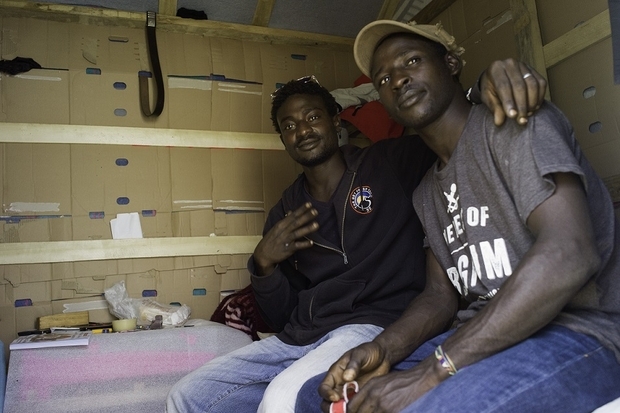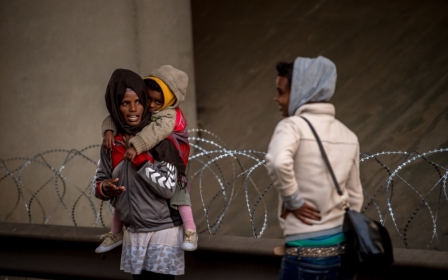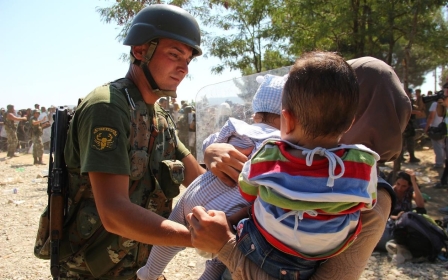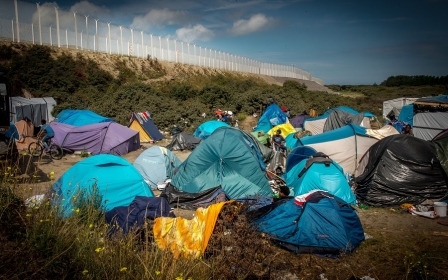A day in Calais’ new Jungle

This summer, the Calais migrant camp has been the centre of political and media attention. Confronted by a humanitarian situation that some organisations do not hesitate to describe as "catastrophic," Manuel Valls, the French Prime Minister, who visited Calais recently, announced the construction of a new humanitarian camp by 2016 with a budget of five million euros allocated by the European Commission. Some 120 tents should be installed to accommodate 1500 people.
The New Jungle gets organised
In the vicinity of the main road, the presence of the camp is obvious. Young black men, clustered in groups of three or four, appear sometimes at road corners, walking or cycling. In Calais, a pretty and neat town, a little empty, a little sleepy, nothing appears to indicate that a refugee camp of 3500 persons is located only seven kilometers away.
From the outside, the "New Jungle," as it has been nicknamed by Calais residents, is a municipal wasteland of 18 hectares. It is surrounded by a double row of barbed wire fences that reinforce the sense of isolation. There, Sudanese, Eritreans, Afghans, and also Ethiopians, some Libyans, Iranians and Syrians have settled in as a temporary procedure that seems to last forever.
In this fallow field, a somehow heterogeneous society, whose members share a common experience of fleeing countries that are either at war or plagued by unsustainable disorders, gets organised.
However, as a symbol of the world’s chaos, the New Jungle is gradually being administered by "neighbourhoods". At the entrance of the refugee camp, there are 12 toilet cabins, lined up next to each other to accommodate the needs of 3,500 people, including 150 women. They were provided by the French state, which also provided electricity towers installed along the camp’s muddy roads that are littered with piles of garbage. The state has also installed trash dumpsters and connected the camp to a drinking water system.
A little further down the road, there is the "shopping district". Some 20 to 30 groceries where confectionery, soft drinks, toilet paper and cigarettes can be found. These unconventional shops display some "special offers" placards awkwardly written in both English and Arabic and meant to entice some hard-to-find costumers.
The "houses" are divided along ethnic lines. "Here is Asia, there is Africa," say Sam and Adam, two 20-year-old Chadians. First, there is the Sudan/Darfur neighbourhood, a little further the Afghan/Pakistan one. Ethiopians gather with the Eritreans, and the Syrians, who were the last to arrive to the camp. The latter settled with great difficulty not far from the tent of the Doctors of the World (Médecins du Monde). Chadians, Iranians and Libyans are joining these major ethnic groups but they are fewer in numbers.
Scattered here and there, some tents have been provided by charitable associations. For the less fortunate, any material is good to build their shelters, including the wood that can be found in the nearby forest. A rough plastic sheet complements the habitat, as well as stones, soil, planks and blankets used to fill gaps, especially as winter approaches. Thus, Kah, a Sudanese man who arrived the day before with his Eritrean wife, digs in the soil with a shovel "to build the roof of his hut because it is going to rain," he said.
While wandering the aisles, one can find several restaurants, including al-Akhwani (The Brothers), a place of eight-square metres offering "chicken and chips, Samoza, Pakura and Bulani", all displayed behind a glass window. Inside the shop, there is an Afghan flag, a small table and a placard on which the words "open 24 hours" are written in both Arabic and English.
But residents also thought about the salvation of the mind and soul. In the Ethiopian neighbourhood stands a 15-metre-high Orthodox church made of solid planks that respects the rules of religious architecture: nave, chancel and altar. Women are busy sweeping with a duster to get ready for the Sunday service which gathers up to 200 people.
Inside, where one must take off one’s shoes before entering, there are no chairs but carpets meticulously arranged by women. The crucifixes, candles, paper flowers and icons showing Christ indicate that the place is Orthodox. An English lady also offered an icon that she delightedly exhibited and cautiously protected in silk paper.
Five mosques are also set up in tents that can accommodate Muslim worshippers, who represent the majority in the camp. There is also a school in this new jungle, a building in which the basics of the French language can be learned. A bookstore, called the Jungle Book and run by an Englishman, offers a place of rest and culture with collected books. That day, some British volunteers brought a sofa in order to make the place more welcoming.
The Jungle's geopolitics
It is as if, in Calais, it is possible to read the various geopolitical crises affecting the planet as one reads the geological strata. The New Jungle has first experienced a massive influx of Sudanese and Darfuris who either fled South Sudan’s civil war or the regime of Omar al-Bashir. Then came the Afghans whose country, torn between foreign interventions and the repressive Taliban regime, continues to collapse.
As for the Eritrean females who represent the majority of the camp’s women, they fled the regime of Afeworki. All are very young, and left the country before the age of 17, a fateful age at which military service is compulsory. Libyans and Syrians, recently arrived, are adding a new layer to this human misery and strata of political terror that settles in the heart of Europe.
All talk about a similar journey made of gruelling travels through Africa before running aground in Libya. They all waited for a possible crew to form in order to cross the Mediterranean. If they make it through the crossing, once in Italy, they take the train to Calais, where they sometimes have friends or some connections.
Ali, a Sudanese who shares his encampment with 14 other people, insists on offering us tea and telling us about his journey and his life in Sudan. He speaks perfect English, learned at the Institute of Languages. "Tell the French that we are quiet people. We fled our country because it was dangerous. We preferred to face all these dangers. But when we arrived here, we did not expect such living conditions."
His friends agree and whisper a few comments: "They say the worst thing is boredom and not knowing what will happen to us. They wonder why they treat us like this." The tea turned cold in a silent room.
However, there is nothing new about this situation as it is a result of a long history. In 1999, a centre was established in Sangatte, 10km from Calais, to receive refugees in transit to the English Eldorado. The centre was closed in 2002 resulting in the creation of camps and squats in Calais’s city centre, while expulsion by the police were taking place.
In June 2014, 2,000 migrants were expelled from the main camp, the Jungle, located on the grounds of the former Tioxide chemical products factory on the outskirts of Calais. The New Jungle was quickly established 7 km away.
Since then, according to the authorities, dozens of people arrive daily. A normal movement favoured by the state itself, which prefers that the migrants settle in the Jungle rather than squatting on private land. The other advantage is that this grouping facilitates the procedures for asylum applications, which are constantly increasing. According to Calais sub-prefecture’s figures, between 55 to 60 requests are filed every week, compared to the 885 cases in all of 2014.
Since then, the French authorities and charities take turns to provide a minimum. April 2015 witnessed the opening of the Jules Ferry centre near the New Jungle. It can in theory accommodate 100 women and children. "But 120 women already live there. Between 100 and 150 women and about 30 children still live in the jungle," Christian Salome, member of the Migrants’ Shelter association, explained to MEE.
At the "Jules Ferry", as it is called by the refugees, a hot meal, with the caloric equivalent of two meals, is served seven days a week. 300 electrical outlets are planned for laptops, as well as showers and toilets.
However, in the camp, migrants have one bathroom for 100-120 people. Such a situation violates international standards, which, in emergency situations, require a toilet for 50 people, and one for 20 in the UN High Commissioner for Refugees camps.
That day, Christian Salome came into the camp with three trucks and 25 volunteers from all over Europe - United Kingdom, Jersey, Netherlands, and Belgium. The same day, some English volunteers came with two trucks full of bedding, clothes and hygiene products. A distribution of supplementary rations is also organised, rations composed of unsold goods collected from the stores of the area: bread, chocolate bars, and fruits, enough to make a small supplement to the single meal.
The line grows quietly, disturbed only by a few boos when a free rider tries to break the line. Salome smiled as he observed the scene: "They can wait like this for more than an hour and a half without getting upset. We just wait till the camp is a little empty to start distributing the bags. Those who are absent usually manage to have a friend to take their rations."
The refugees welcome and invite the rare visitors to enter their tent, offering tea, sweets or even to share their meal. "Why be surprised? We are better welcomed here than in many French villages," insists Salome. Some even made us visit their shelters. They explain that they built a kitchen corner here and over there an eight-square-metre room where five people sleep.
Suddenly, a refugee stops us, he wants to connect the smart phone he just bought but does not understand French. We then ask an operator’s assistance who asks for an ID number. The refugee smiles: "Tell her that I am a refugee, I have no identity card. But can I still have a phone? I want to call my family and tell them I'm fine."
Indeed, more and more associations are contacted by families who are sometimes left without any news. "Sometimes we receive a search notice from families via social networks, asking if this or that person has been seen. But there is such back-and-forth that it makes the task difficult. Sometimes we had to announce that people had died," said a volunteer.
In the Doctors of the World tent, 80 people come every day to have their health issues checked, including scabies or fractures caused by attempts to reach the UK. A dozen disabled people moving on crutches reflect the risk of these dangerous passages.
Women, usually very young, go in groups for a stroll. According to Salome, everything is going well for these 150 women living in the Jungle, "given the circumstances there”. “No violence is used against them. Yesterday, an Eritrean woman arrived and was taken care of by a Sudanese man who didn’t abuse her," Salome added.
Asylum or exile: 'finger print' or 'Britain'
According to Salome, among the 3,500 refugees in the camp, "500 want to remain in France, 3,000 want to cross to Britain". Many have family in the UK, which is their main motivation. Others think that life is less hard there. Such is the case of Sam and Adam who said with a wide smile: "France does not welcome the migrants well. The British welcome them better." Yet, these young Chadians, who left their country in 2008 and went through the war in Libya, have crossed the Mediterranean then Italy and now are waiting to cross to England.
Hussein, a young Sudanese, says he just wants to cross the tunnel to say "f***" to the English people. "They do not like us. I want to cross and say 'f *** you' then return to France. There should not be any borders - why do they treat us like this?" Hussein decided to take another chance in a week. "I am free in my mind," he said before offering us, too, to share his meal.
However, according to Salome, once they cross the Channel, the refugees become quickly disillusioned. "A Sudanese, who managed to cross, contacted me and said Calais was much better, for there, he had some hope. But now in Britain, he is desperate. One must have the courage to go after their dreams and acknowledge the failure,” he noted.
The passage to Britain follows a game of supply and demand that sets the market price for smugglers. Salome can only observe this traffic helplessly: "From the moment you block a border, you create a smuggling system. It is that simple to understand. And the harder the border is to cross, the higher the price is. Those who do not have money go through the Eurotunnel, boarding the running trains. Those who have money pay. Right now, the passage costs 5,000 euros. With this amount, one can cross the next day. The less money you have, the longer you wait. And those who arrive here have nothing; sometimes, they call their families to ask for help to finance the crossing."
The Eurotunnel company counted up to 2,000 intrusion attempts per night during July, with several deaths or serious accidents.
The others, who chose asylum in France, speak of the symbolic step of fingerprinting to establish the asylum file. "Finger print", they insist by showing the official papers, carefully preserved in plastic, that prove that somewhere they count and have a legal existence.
Yet, according to associations, these procedures take too long. While the state has created a service that accommodates asylum seekers in Calais sub-prefecture, and even offers to transport them there, "it takes forever to build an asylum application,” explains Maya Konsorti, a community activist. “If a migrant made a refugee claim today, there would be no appointment before November or December, and this appointment would be only to submit a file. Meanwhile, this refugee is left in the street without resources or shelter, for about six to 10 months," she protests. Those who get the appointment are then directed to the reception center for asylum seekers (RCAS).
The night falls gradually. A Syrian refugee challenges us: "Why does Prime Minister Valls come? What will he announce? Anyway, we'll all leave, it will be cold. Winter is coming in the New Jungle," he said sarcastically.
Translation from French by Ali Saad
Middle East Eye propose une couverture et une analyse indépendantes et incomparables du Moyen-Orient, de l’Afrique du Nord et d’autres régions du monde. Pour en savoir plus sur la reprise de ce contenu et les frais qui s’appliquent, veuillez remplir ce formulaire [en anglais]. Pour en savoir plus sur MEE, cliquez ici [en anglais].






